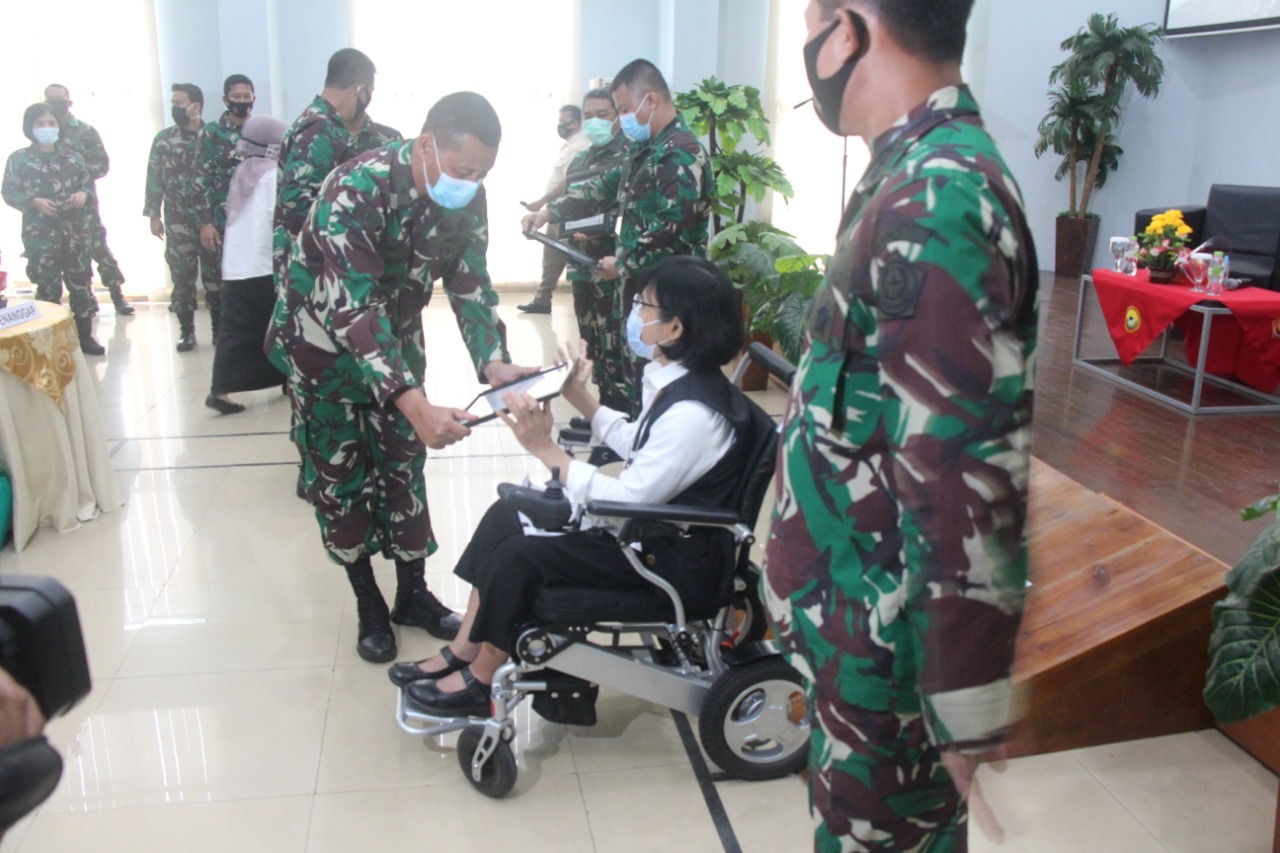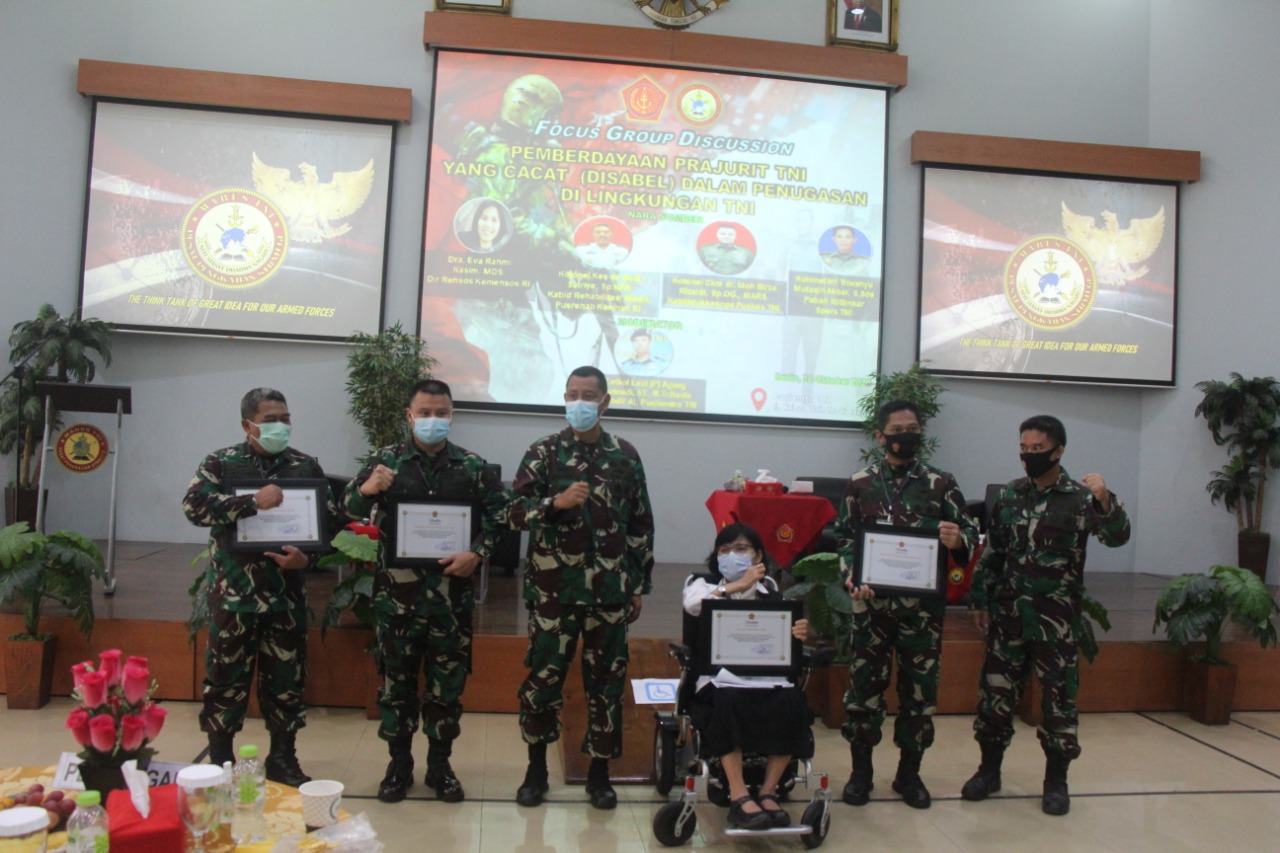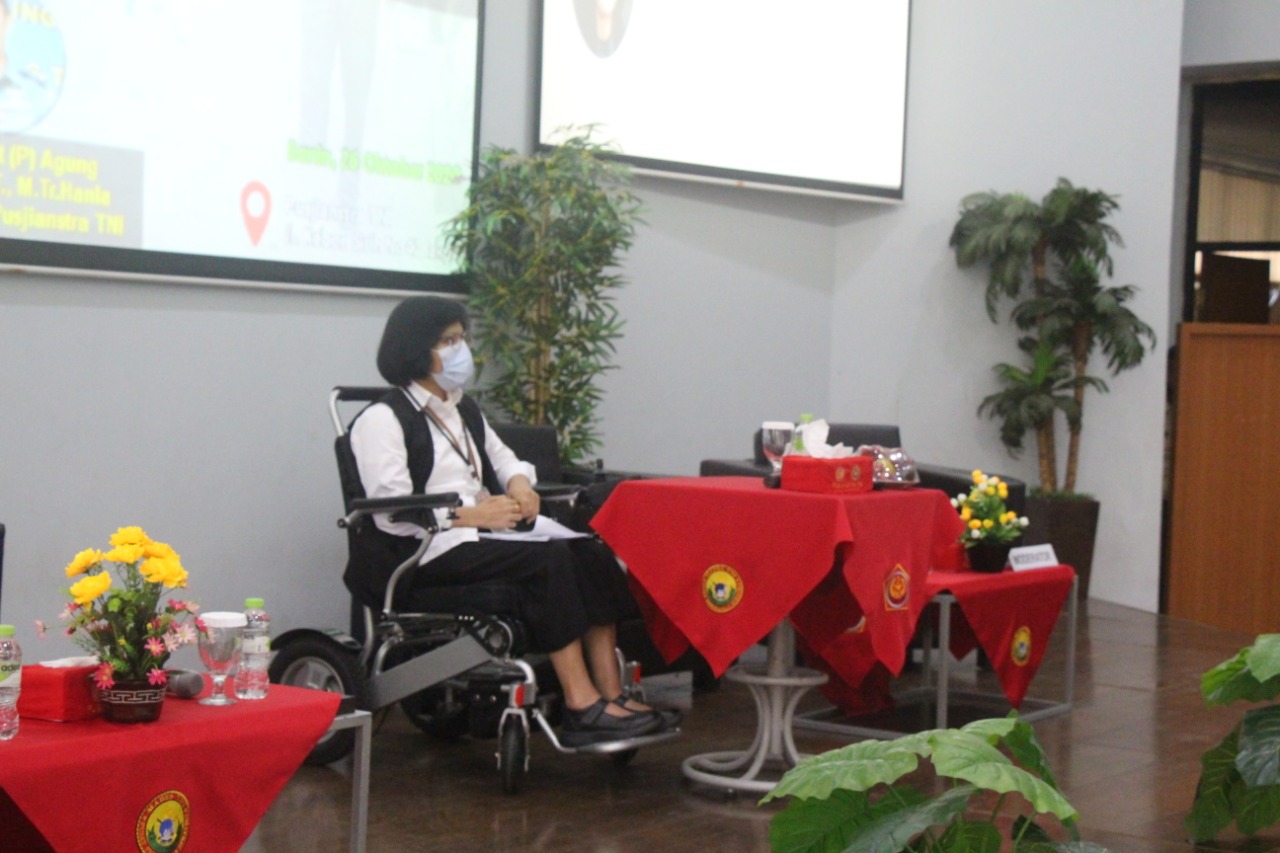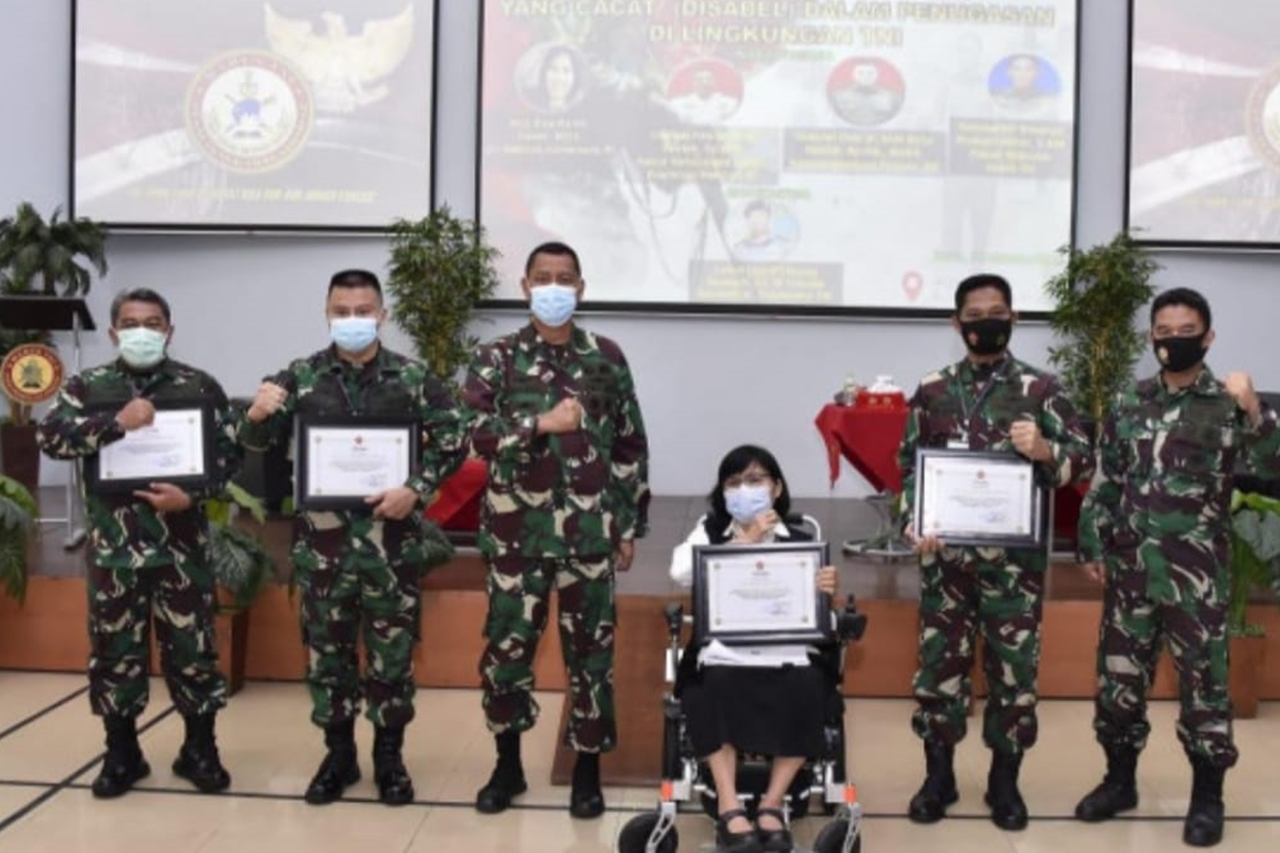Writer :
Humas Dit. Penyandang Disabilitas
Editor :
Intan Qonita N
Translator :
Intan Qonita N
JAKARTA (October 27, 2020) - Law Number 8 of 2016 states that Persons with Disabilities are any person who has physical, mental, intellectual or sensory limitations for a long period of time who in interacting with the environment can experience obstacles and difficulties to participate fully and effectively with other citizens based on equal rights.
The Director of Social Rehabilitation for Persons with Disabilities at the Ministry of Social Affairs, Eva Rahmi Kasim, conveyed this in the Focus Group Discussion (FGD) "Empowering TNI Soldiers with Disabilities in Assignments within the TNI" which took place at the Auditorium of the TNI Strategic Studies Center (Pusjianstra) Jakarta.
"The Ministry of Social Affairs has technical policies in fulfilling disability rights, namely respecting, protecting and fulfilling the rights of persons with disabilities; strengthening the integrated social rehabilitation system with social security, social empowerment and social protection," Eva explained.
Furthermore, expanding the reach of family, community and residential-based social rehabilitation for persons with disabilities; strengthening the capacity and institutions of Social Rehabilitation Centers and Social Welfare Agencies.
Eva added that the fulfillment of disability rights is also supported by increasing prevention, education and sensitization campaigns in all sectors and society; increasing the role of the community and the private sector in social rehabilitation services and synchronizing data collection for persons with disabilities.
"Social Rehabilitation Centers for Persons with Disabilities have 19 (nineteen) Technical Implementation Units (UPT) which have work coverage areas spread throughout Indonesia," explained Eva. The UPT is the implementer of the Ministry of Social Affairs' Social Rehabilitation Assistance (ATENSI) program in the regions through activities to support the fulfillment of a decent life, social care, family support, psychological social therapy, skills and entrepreneurship training, social assistance and assistance and accessibility support.
In this FGD opportunity, the Head of the Rehabilitation Center (Pusrehab) of the Ministry of Defense, Budiman, supports efforts to fulfill the rights of persons with disabilities by increasing the motivation and work ethic of TNI personnel with disabilities.
"Rehabilitation Center of Ministry of Defense has two work programs, namely organizing return-to-combat plenary medical rehabilitation for post-traumatic or injured TNI personnel, which aims to restore enthusiasm and physical ability to return to combat by means of intensive psychotherapy and complete comprehensive medical rehabilitation," Budiman said.
The Director of Social Rehabilitation for Persons with Disabilities at the Ministry of Social Affairs, Eva Rahmi Kasim, conveyed this in the Focus Group Discussion (FGD) "Empowering TNI Soldiers with Disabilities in Assignments within the TNI" which took place at the Auditorium of the TNI Strategic Studies Center (Pusjianstra) Jakarta.
"The Ministry of Social Affairs has technical policies in fulfilling disability rights, namely respecting, protecting and fulfilling the rights of persons with disabilities; strengthening the integrated social rehabilitation system with social security, social empowerment and social protection," Eva explained.
Furthermore, expanding the reach of family, community and residential-based social rehabilitation for persons with disabilities; strengthening the capacity and institutions of Social Rehabilitation Centers and Social Welfare Agencies.
Eva added that the fulfillment of disability rights is also supported by increasing prevention, education and sensitization campaigns in all sectors and society; increasing the role of the community and the private sector in social rehabilitation services and synchronizing data collection for persons with disabilities.
"Social Rehabilitation Centers for Persons with Disabilities have 19 (nineteen) Technical Implementation Units (UPT) which have work coverage areas spread throughout Indonesia," explained Eva. The UPT is the implementer of the Ministry of Social Affairs' Social Rehabilitation Assistance (ATENSI) program in the regions through activities to support the fulfillment of a decent life, social care, family support, psychological social therapy, skills and entrepreneurship training, social assistance and assistance and accessibility support.
In this FGD opportunity, the Head of the Rehabilitation Center (Pusrehab) of the Ministry of Defense, Budiman, supports efforts to fulfill the rights of persons with disabilities by increasing the motivation and work ethic of TNI personnel with disabilities.
"Rehabilitation Center of Ministry of Defense has two work programs, namely organizing return-to-combat plenary medical rehabilitation for post-traumatic or injured TNI personnel, which aims to restore enthusiasm and physical ability to return to combat by means of intensive psychotherapy and complete comprehensive medical rehabilitation," Budiman said.
In addition, "Rehabilitation Center also organizes return-to-duty integrated rehabilitation for persons with disabilities of Indonesian National Army (TNI) personnel and civil servants (ASN) of the Ministry of Defense, namely vocational rehabilitation combined with medical rehabilitation, social rehabilitation with hospital facilities and administrative support," he added.
TNI Health Center (Puskes) Doctor Mohamad Birza Rizaldi also attended today's FGD explaining efforts to improve health services and minimize discrimination against TNI/ASN personnel with disabilities.
"The problems faced today are discrimination against TNI with disabilities, limited hospital facilities and infrastructure that are not yet suitable for people with disabilities, and the inability of the TNI with disabilities to fulfill the requirements to attend education/courses/schools or even promotions," said Birza.
In terms of career paths for TNI with Disabilities, according to TNI Personnel Staff (Spers), Triwahyu Mutaqin Akbar said that the basis for implementation is in accordance with Panglima Regulation (Perpang) Number 53 of 2017 concerning the Use of Indonesian National Army Soldiers.
"In the war, it does not regulate the difference in treatment between TNI soldiers who have normal physical conditions and TNI soldiers with disabilities; as long as a TNI soldier with a disability is able to carry out his duties, he will still be allowed to continue to carry out his soldiering service. Then, the opportunities for a TNI with Disabilities in pursuing a career include rank, education and position will be adjusted to his ability," explained Triwahyu.
Disability involves many components, including health, cultural, political, environmental and economic aspects. Having a disability does not mean that you are not physically and mentally healthy.
TNI Health Center (Puskes) Doctor Mohamad Birza Rizaldi also attended today's FGD explaining efforts to improve health services and minimize discrimination against TNI/ASN personnel with disabilities.
"The problems faced today are discrimination against TNI with disabilities, limited hospital facilities and infrastructure that are not yet suitable for people with disabilities, and the inability of the TNI with disabilities to fulfill the requirements to attend education/courses/schools or even promotions," said Birza.
In terms of career paths for TNI with Disabilities, according to TNI Personnel Staff (Spers), Triwahyu Mutaqin Akbar said that the basis for implementation is in accordance with Panglima Regulation (Perpang) Number 53 of 2017 concerning the Use of Indonesian National Army Soldiers.
"In the war, it does not regulate the difference in treatment between TNI soldiers who have normal physical conditions and TNI soldiers with disabilities; as long as a TNI soldier with a disability is able to carry out his duties, he will still be allowed to continue to carry out his soldiering service. Then, the opportunities for a TNI with Disabilities in pursuing a career include rank, education and position will be adjusted to his ability," explained Triwahyu.
Disability involves many components, including health, cultural, political, environmental and economic aspects. Having a disability does not mean that you are not physically and mentally healthy.
Share :
 English
English
 Bahasa
Bahasa




